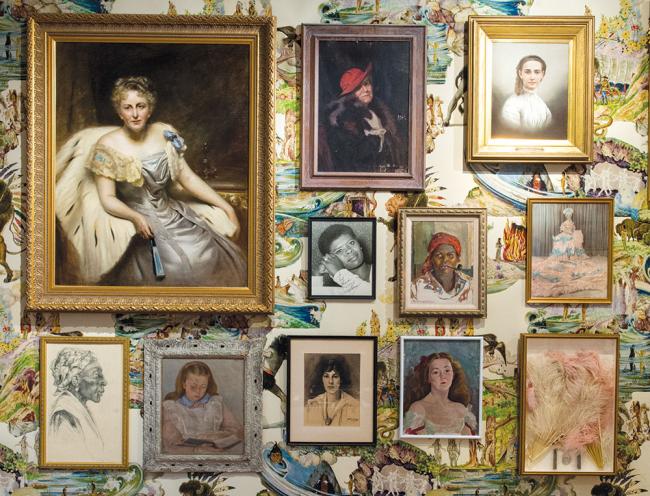The exhibit’s four rooms showcase an assembly of more than 400 objects pulled from archives at Tulane University. The artists, Los Angeles–based Fallen Fruit, created the exhibit to serve as one immersive work.
“When visitors walk in, they see beauty,” said Thomas Friel, coordinator for interpretation and public engagement at the museum. “But when you peel back the layers you’ll find invasive flowers on the wallpaper, beautiful furniture that once sat inside a brothel, and inaccurate depictions of Native Americans.”
In this exhibit, there are no labels. Guests are offered the opportunity to develop their own ideas about what the art installation is all about. The “Women’s Room” (facing page) highlights more than two dozen portraits of women, many of whom are significant in the history of Tulane and Newcomb College. Those featured represent “empowerment, freedom, oppression, celebration, beauty, gender, life and death,” Friel said. The room also contains books and a three-panel “posture mirror” used by 20th-century female students to check their bearing—an exercise that emphasized their need to have both public and private personas.
In another room of the exhibit is Brandan “BMike” Odums’ Alchemist (above) (2015) (9 feet by 9 feet, spray paint and gold leaf on unstretched canvas), a recent gift to the museum by an alumnus.
In the exhibit’s art guide, museum director Monica Ramirez-Montagut writes that he project in celebration of the city’s tricentennial allows viewers “to experience a moment of collective creation, one that in [Fallen Fruit’s] words is a ‘true and real moment where everything is possible’ and a moment, just like New Orleans, where ‘everything can be redefined.’”
The exhibit is on display through Dec. 22, 2018.
Empire Exhibit
If one could enter a door that leads inside a mind full of historic memories, that experience might feel the same as walking through the EMPIRE exhibit at the Newcomb Art Museum.
If one could enter a door that leads inside a mind full of historic memories, that experience might feel the same as walking through the EMPIRE exhibit at the Newcomb Art Museum.































































